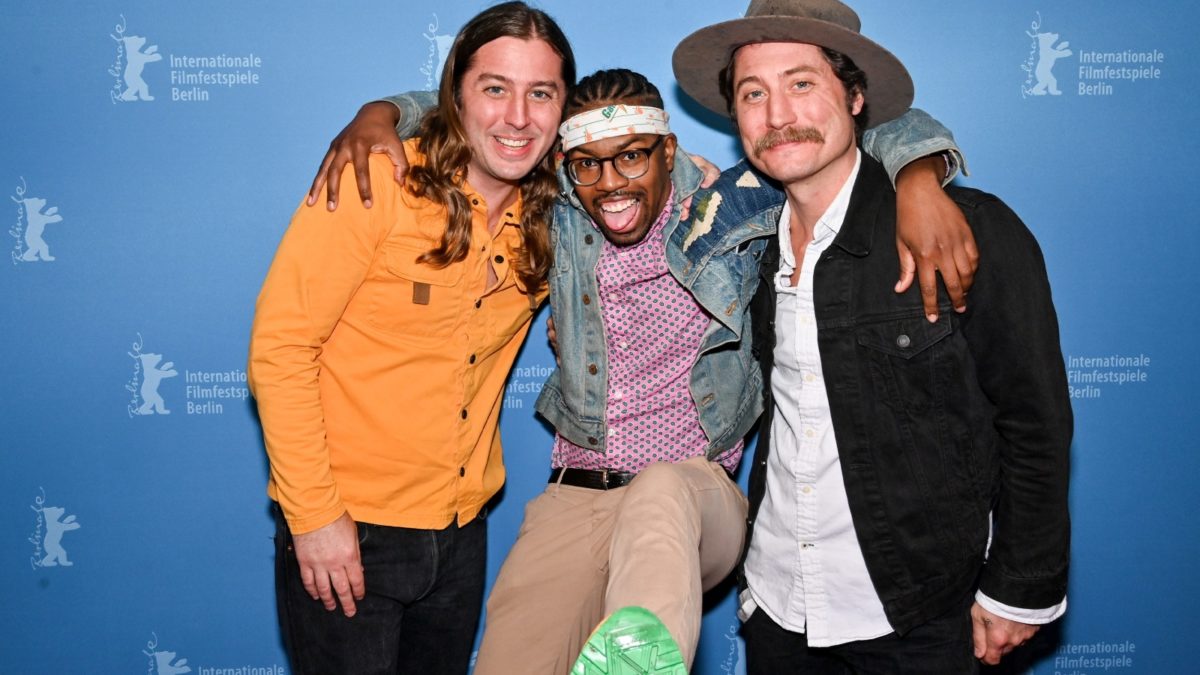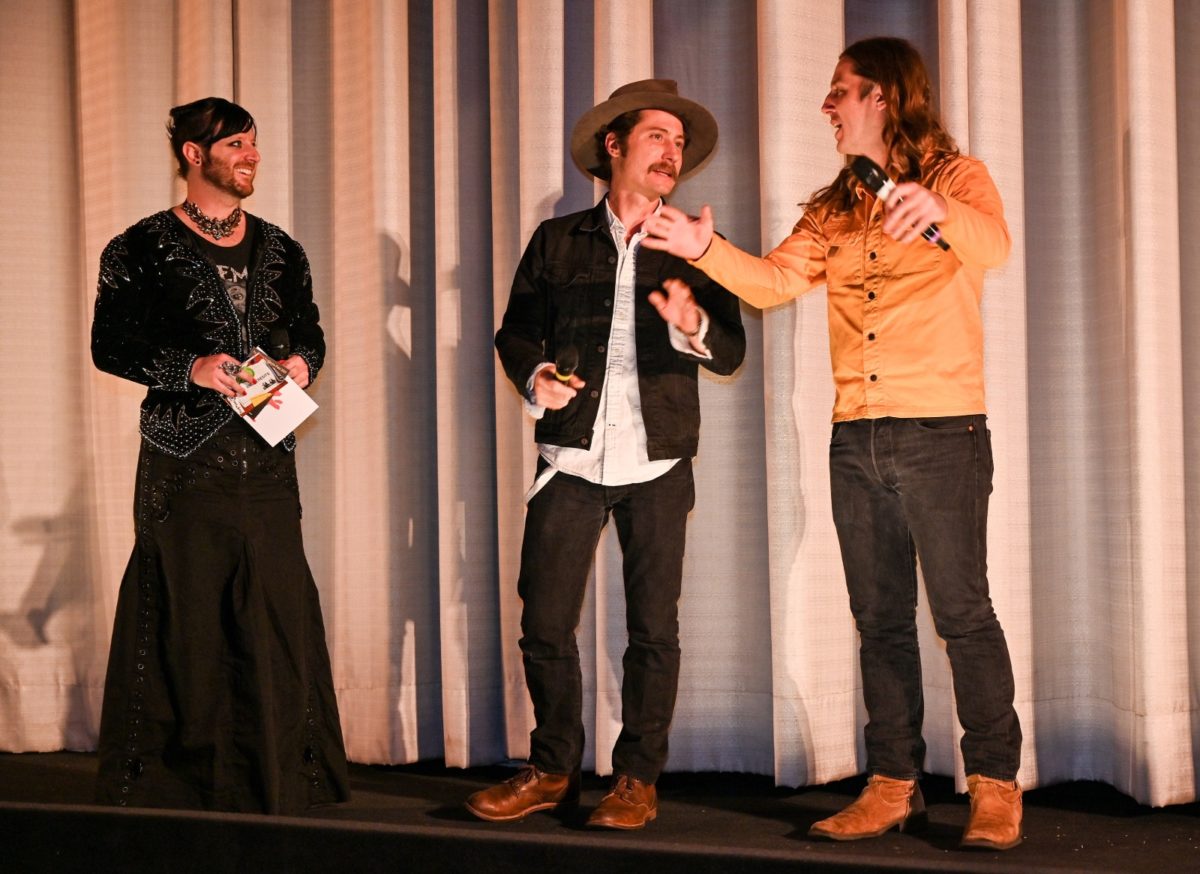In 2007, the Ross brothers left a life in Hollywood (Bill was an editor of blockbuster trailers; Turner worked in set design) to make a movie in their hometown of Sydney, Ohio. They called it 45365, after the area’s zip code, and filled it with images of schools and churches; streets and neighbors. In 2009, the film won the Documentary Grand Jury prize at Sundance.
Three films, 11 years, and many awards later, the brothers return with Bloody Nose, Empty Pockets, a documentary/social experiment hybrid that takes place in a Las Vegas bar called the Roaring 20’s as its loyal patrons prepare to raise a final glass (or two) to its closing down. The rub is that the Roaring 20’s does not exist–at least in Las Vegas. Shot in New Orleans with a group of mostly non-professional actors, Bloody Nose feels less like a documentary and more like an immersive theater piece. The bar might not be real, but the booze certainly is. Question being, what else is?
The Film Stage: For someone who’s bartended for years, the world of Bloody Nose felt entirely believable. Was creating it more a matter of set design or finding the right location?
Bill Ross: It’s a composite. We had certainly done our research, and in composing this we scouted a lot of bars trying to find that quintessential space but also to see what the commonality is there, from a set decoration perspective. What are the common themes here? What could help embellish this? I mean eventually, the shell of the thing is a great bar with minor embellishments.
You mention embellishments. Bloody Nose could easily be seen as a documentary but we know certain things aren’t real. how much would you ideally like an audience member to know before they see the film?
Bill: I don’t know. In an ideal world we would love people to come in and see a movie. And say, I’m going to go to the cinema to watch a movie and have this experience and not have questions about the framing, you know?

Turner Ross: And if it leads to a conversation, great. But, yeah, we just want it to be, “I’m watching a film.”
Bill: It’s a scenario that is not unique just to this film. If you go to watch Star Wars you don’t need to know a lot of new things, you know? You just get to go. But something about documentary, like the framing and the understanding of where people are coming from, how things are done, comes into it. So the place in the middle is a weird space.
How blurred was that line between fact and fiction for the actors?
Turner: Oh for the actors? Yeah, to varying degrees. Some folks, you know, we told them what was up and they took to it. And some folks were a little confused here and there.
Bill: We had discussions about it in advance. This is a composed scenario. It’s a premeditated happening. So none of us knew what the end result would be, but we all understood the intention.
How did you go about the casting process, did you go from bar to bar to find these people?
Bill: Yeah, there were a lot of late nights going bar to bar. And days, cause we needed day drinkers as well. Some folks were pulled from our own lives.
Turner: We did do a dozen casting sessions in different watering holes, looking for certain archetypes and certain dynamics. And who relates to who and how. Who’s Norm at the end of the bar, you know? It took a while to piece it all together cause we had to create a certain alchemy so these people could bounce off each other.
Did they meet before the day of the shoot?
Bill: Some, because we needed that, like we would cast someone and be like, who’s your drinking buddy? And if we met them and they were great we’d use them as well.
Turner: Yeah, so some alliances were already forged and then new ones in the happening.
We ‘re shown a lot of what’s playing on the TV screens. Did you select what was being shown?
Bill: Oh, about half of the stuff on the TV screens is chosen and about half is random.
Turner: It’s also understanding the time of day in a bar. So it’s like, in the morning they’re watching game shows. You get the evening news at a certain point. There are a few bars that we know where all of a sudden Turner Classic Movies comes on the TV and you’re just watching random old films. And sometimes there are weird moments of serendipity there where they seem to be speaking to you.
Bill: The best stuff was the random serendipitous stuff but the stuff we chose we thought spoke to the themes within our film as well. So like The Misfits was a big reference for us.
Was it Titanic that came on at some point?
Bill: [Laughs.] Yeah, the original version.
The music playing as the ship goes down.
Turner: [Laughs.] Yeah, oh my god.

Music is quite important to the whole mood. Were the tunes we hear just playing randomly from the jukebox?
Bill: Yeah, we tried to shoot the film without the jukebox being on, so we could edit it. That lasted about twenty minutes before there was a mutiny and they took over. [Laughs.] Within a few minutes we were just an afterthought and they were just doing their own thing, which was perfect for us.
Was it really shot over the course of one night?
Bill: We were there until 7 in the morning.
Turner: The primary shoot that most of it is built around is an 18 hour, non-stop, 2-camera, unbroken scene.
Bill: And then we went to Waffle House and it was the best meal I’ve ever had. [Laughs.]
We have the bar as this kind of microcosm, but then we hear all these outside events being mentioned on the news and in conversation. Was there a connection being drawn between the two?
Turner: I mean there’s an inherent connection; this is what people are responding to. People are not just responding to the scenario that we’ve created in the experiment we’re all going through, but a common moment in time—especially for Americans in America. Yeah, and there’s a clip of T.D. Jakes on the TV and he’s saying, “Why do we put all our hope in one person when it should be in each other?”
Bill: And that was a serendipitous thing. We could not have planned it. This is what we’re all responding to. While it’s not an overtly political film, everything is eventually. And everybody’s going through that shared moment together. So it became an act of catharsis. We shot it the day after Trump got elected so it could have been much more.
Turner: That’s just not very interesting. That’s the main discourse ad nauseam, for everyone, you know? And so what are we actually talking about when we’re not talking about that?
Bill: Yeah, I don’t wanna watch that movie.
Bloody Nose, Empty Pockets screened at the Berlin International Film Festival and is now available digitally.
This interview has been edited and condensed for clarity.
